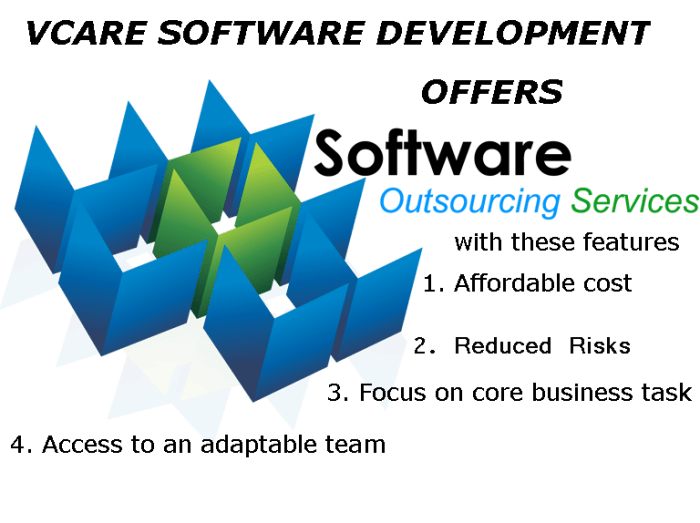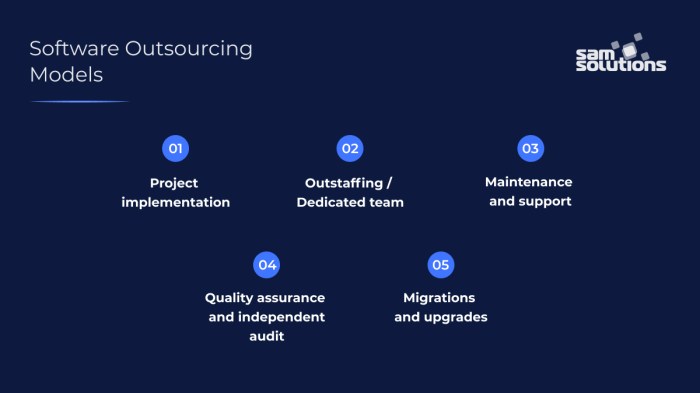Software development outsourcing & support services – In today’s dynamic business environment, leveraging external expertise has become a strategic imperative for organizations of all sizes. Software development outsourcing and support services offer a powerful solution for companies seeking to enhance efficiency, reduce costs, and access specialized skills without the overhead of in-house teams. This comprehensive guide delves into the intricacies of outsourcing software development, exploring its benefits, challenges, and best practices.
Understanding Software Development Outsourcing
Software development outsourcing involves contracting a third-party company or individual to handle all or part of a software development project. This can encompass various aspects, from initial design and coding to testing, deployment, and ongoing maintenance. Outsourcing offers access to a global talent pool, enabling businesses to tap into specialized skills and expertise that might be unavailable or cost-prohibitive internally.
This can include expertise in specific programming languages (like Java, Python, C++, PHP, JavaScript, Ruby on Rails), specific development methodologies (Agile, Waterfall, DevOps), or specialized domains like AI, machine learning, or blockchain development.

Source: vcaresoftwaredevelopment.com
Types of Software Development Outsourcing Models, Software development outsourcing & support services
- Nearshoring: Outsourcing to a company in a geographically proximate country, often offering cultural and time zone advantages.
- Offshoring: Outsourcing to a company in a geographically distant country, typically to leverage lower labor costs.
- Onshoring: Outsourcing to a company within the same country, often chosen for ease of communication and regulatory compliance.
- Project-based Outsourcing: Engaging an outsourcing partner for a specific project with defined deliverables and timelines.
- Dedicated Team Outsourcing: Building a dedicated team within an outsourcing partner that works exclusively on your projects.
Benefits of Software Development Outsourcing
Outsourcing software development offers numerous advantages, including:
- Cost Reduction: Access to lower labor costs, especially when offshoring to countries with lower average salaries.
- Access to Specialized Skills: Tap into a global talent pool with expertise in niche technologies and domains.
- Increased Efficiency and Productivity: Focus internal resources on core business functions while outsourcing non-core activities.
- Faster Time to Market: Leverage the expertise of experienced outsourcing teams to accelerate development cycles.
- Scalability and Flexibility: Easily scale development resources up or down based on project needs.
- Reduced Risk: Transfer some of the development risk to the outsourcing partner.
Challenges of Software Development Outsourcing
While outsourcing offers significant benefits, it’s crucial to acknowledge potential challenges:
- Communication Barriers: Language and cultural differences can hinder effective communication and collaboration.
- Time Zone Differences: Coordinating work across different time zones can present logistical challenges.
- Quality Control: Ensuring the quality of outsourced work requires robust processes and monitoring.
- Security Risks: Protecting intellectual property and sensitive data requires careful consideration of security protocols.
- Hidden Costs: Unexpected costs can arise from communication, travel, and contract management.
- Loss of Control: Outsourcing can lead to a perceived loss of control over the development process.
Choosing the Right Outsourcing Partner: Software Development Outsourcing & Support Services
Selecting the right outsourcing partner is critical to project success. Consider the following factors:
- Experience and Expertise: Evaluate the partner’s track record, client testimonials, and technical capabilities.
- Communication and Collaboration: Assess their communication skills, responsiveness, and willingness to collaborate.
- Quality Assurance Processes: Understand their quality assurance procedures and methodologies.
- Security Measures: Evaluate their security protocols and data protection measures.
- Contract Terms: Carefully review the contract to ensure clear expectations and protection of your interests.
- Pricing and Payment Terms: Negotiate fair and transparent pricing and payment terms.
Software Development Outsourcing Support Services
Effective outsourcing extends beyond the initial development phase. Ongoing support services are essential for maintaining and enhancing the software after deployment. These services typically include:
- Maintenance and Bug Fixing: Addressing bugs, fixing errors, and providing ongoing maintenance.
- Technical Support: Providing assistance to end-users and resolving technical issues.
- Upgrades and Enhancements: Implementing software upgrades, adding new features, and improving functionality.
- 24/7 Support: Offering round-the-clock support to ensure continuous availability.
- Security Updates and Patches: Regularly applying security patches and updates to protect against vulnerabilities.
Best Practices for Successful Outsourcing
- Clearly Define Requirements: Create detailed specifications and documentation to avoid misunderstandings.
- Establish Clear Communication Channels: Implement regular communication channels to facilitate collaboration.
- Utilize Project Management Tools: Employ project management tools to track progress and manage tasks.
- Implement Robust Quality Control Measures: Establish rigorous testing and quality assurance procedures.
- Build Strong Relationships: Foster a collaborative relationship with your outsourcing partner.
- Regularly Monitor Performance: Track key performance indicators (KPIs) to assess progress and identify areas for improvement.
Frequently Asked Questions (FAQ)
- Q: How much does software development outsourcing cost? A: The cost varies greatly depending on factors such as project scope, complexity, location, and the outsourcing partner’s rates.
- Q: How can I ensure the quality of outsourced software development? A: Implement robust quality control measures, including thorough testing, code reviews, and regular communication with your outsourcing partner.
- Q: What are the risks associated with software development outsourcing? A: Potential risks include communication barriers, quality control issues, security concerns, and hidden costs. Careful planning and partner selection can mitigate these risks.
- Q: How do I choose the right outsourcing partner? A: Consider factors such as experience, expertise, communication skills, quality assurance processes, security measures, and contract terms.
- Q: What types of software development projects are suitable for outsourcing? A: Many types of projects are suitable, including web application development, mobile app development, custom software development, and software maintenance.
Conclusion
Software development outsourcing and support services offer a powerful way for businesses to gain a competitive edge. By carefully selecting an outsourcing partner and implementing best practices, organizations can leverage the benefits of outsourcing to achieve their software development goals efficiently and cost-effectively. Remember, thorough planning, clear communication, and robust quality control are key to successful outsourcing.
Call to Action
Ready to explore the possibilities of software development outsourcing? Contact us today for a free consultation to discuss your project requirements and find the perfect outsourcing partner for your needs.
Answers to Common Questions
What are the common risks associated with software development outsourcing?

Source: reliasoftware.com
Common risks include communication barriers, intellectual property concerns, quality control issues, and potential time zone differences affecting collaboration.
How can I choose a reputable software development outsourcing provider?
Look for providers with a proven track record, positive client testimonials, a clear understanding of your needs, and robust security protocols.
What types of support services are typically offered?
Support services often include maintenance, bug fixes, updates, and ongoing technical assistance after the initial development phase.
What is the typical cost structure for outsourcing software development?

Source: sam-solutions.us
Cost structures vary widely depending on factors like project complexity, team size, location of the provider, and the specific services required. It’s crucial to obtain detailed quotes from multiple providers.
